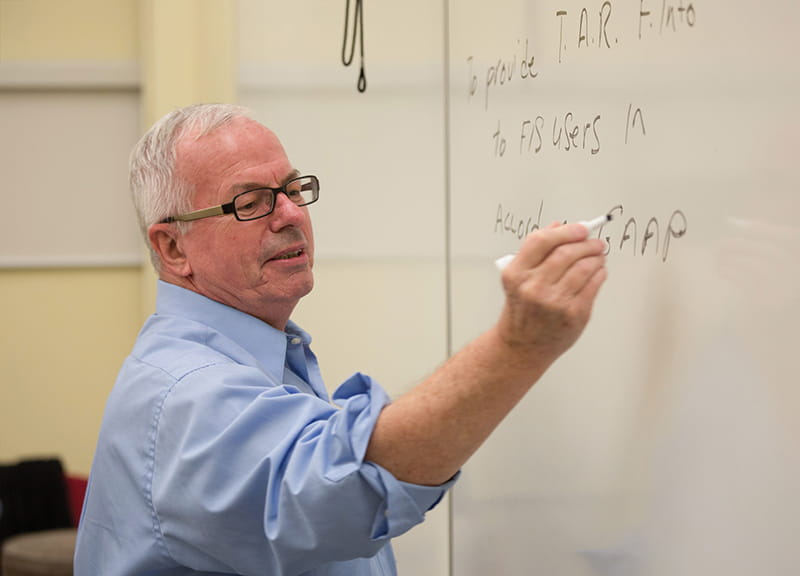
A new paradigm for business education
 by Carolina Salcedo – Jan 13, 2016
by Carolina Salcedo – Jan 13, 2016 Sheridan’s Bachelor of Business Administration (BBA) degrees aren’t teaching business students ‘stuff.’ They’re teaching them how to think, both critically and creatively.
Launched in 2014, the BBA degrees were designed to respond to employer demands for a different kind of skill set. Under the leadership of Dean Sylvia Lowndes, the Pilon School of Business (PSB) based its design on a growing body of academic research that demonstrates the importance of teaching critical, creative, and reflective thinking skills as opposed to the traditional approach of focusing on content delivery and learning through memorization. These are connected to a set of essential skills for success identified by Harvard education researcher, Tony Wagner. They are: critical thinking and problem-solving; collaboration; agility and adaptability; initiative and entrepreneurship; effective communication; accessing and analyzing information; and curiosity and imagination.
“Educational research tells us that reflective thinking, or metacognition, is where the real deep learning takes place” – Jeremy Staples
Reflective thinking, in particular, plays a critical role. “Educational research tells us that reflective thinking, or metacognition, is where the real deep learning takes place,” says Jeremy Staples, an Associate Dean at the Pilon School of Business and one of the driving forces behind the unique approach to learning in the BBA degrees. Looking back on what you’ve learned and examining it from different perspectives is critical, he explains. “That’s ultimately how we really absorb knowledge, as opposed to the traditional model of strictly memorizing material in the short term”.
Reflective thinking goes hand-in-hand with experimentation, practice, and embracing failure as deep learning tools. This combination is essential in preparing students to manage the realities of the workplace, particularly in business: ambiguity, uncertainty, and constant change. Together, these principles underpin the approach to learning in the BBA degrees.
The faculty leadership team worked with many PSB professors who had already begun to embrace this approach in their own teaching over the years to help integrate it intentionally it into the design of the degrees. The degrees are designed to incorporate the principles of reflection, experimentation, and practice throughout every course.
The BBA approach at work
So what does this look like in the classroom?
BBA courses use the flipped model of teaching – the students explore content ahead of time and complete pre-work before coming to class, and class time is used for discussion and practice. Reflection exercises play a strong role. Each professor integrates reflective learning into their courses in a unique way: tasking students with revisiting problems they solved in past weeks, bringing new perspectives to each case; working through case studies from different viewpoints, journaling, tackling capstone projects with real-world clients; creative problem-solving challenges, and more. Classes are often a series of team discussions. While traditional assignments still play a role, BBA courses also include challenges like competitions and videos to help students better process and apply what they’ve learned. Each assignment is specifically designed to help students develop at least one of Wagner’s essential skills.
The BBA degree includes two Creative Learning Portfolio courses to help students intentionally integrate reflective learning throughout their studies in the BBA, and help them prepare an interview-ready portfolio at the end of their studies. The main deliverable of the first introductory course is a video development story where each student reflects on their new understanding of their learning style, personal development goals, learning journey thus far, and the unique ‘lens’ they bring to their business studies.

The role of the professor has changed from strictly delivering content to becoming a facilitator of active learning through use of techniques including class discussion and team problem solving. “When you walk into a BBA classroom, you’re walking into a lab,” says Anne-Liisa Longmore, Associate Dean at PSB. “You’ll see hubs of activity, experimentation and discussion at every group table, and the professor serving as a guide to help students through the thinking and learning process.” Since her involvement with the early days of the program’s design, Anne-Liisa worked closely with other faculty team members in the cultivation of the PSB community of practice that enables fellow professors to work together and learn from one another as they expand their practice to include the BBA teaching approach.
“When you walk into a BBA classroom, you’re walking into a lab” – Anne-Liisa Longmore
The impact for Business students
Now in its second year, the degree is already having a big impact on its first cohort of students. “The more students experience this model and get used to it, the more I find they crave it,” says Scott Hadley, a Professor in Supply Chain and Operations Management. “I see them walk out of the classroom energized, not tired.”
“The more students experience this model and get used to it, the more I find they crave it” – Scott Hadley
Second-year BBA Marketing Management student, Brittany Tapper, has found the BBA approach refreshing. “I am a hands-on learner and I realized I really need an experiential component in order to retain and apply information,” she says. Brittany has found the BBA approach especially effective since she came back to school after working for a few years– she sees how the BBA learning style connects to the practical challenges of the workplace. “BBA classrooms feel like a collaborative community; there’s movement, group problem-solving, and the professor is there to help you through the process and expand your thinking.”
The first cohort of Sheridan’s BBA students is now preparing to finish their second year in the program – the second year in a journey to become more adaptable, creative and innovative thinkers. “For business grads, the key factor for long-term success is their ability to learn how to think,” says Jeremy Staples. Through the learning approach in the BBA degree, Sheridan is preparing grads that are not only knowledgeable, but ready to thrive in the work environment of the future.
Pictured at top of page: Team discussions and problem-solving are a key part of the Sheridan BBA experience
Written by: Carolina Salcedo, Internal Communications Officer at Sheridan.
Media Contact
For media inquiries, contact Sheridan’s Communications and Public Relations team.





